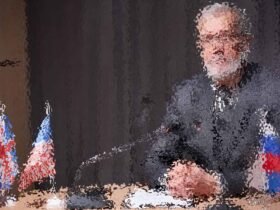Meet GoDigital, the happiness-obsessed company that wants to buy Vice Media
When Suroosh Alvi, Gavin McInnes, and Shane Smith started Vice magazine, later becoming Vice Media, they created a company based on a punk rock, counterculture image. Smith once had a tour of the media company’s Brooklyn, New York, headquarters recorded while he was nearly naked and intoxicated.
The business is called Vice. It’s obvious what it is.
Vice, once valued at $5.7 billion, is preparing to exit bankruptcy the following week. A little-known Los Angeles company that wants to buy it has a quixotic culture that would be unmatched by those early Vice days and would almost certainly be mocked.
An array of different businesses are owned by the privately held conglomerate GoDigital Media Group, which also owns video and music rights, particularly in the Latin genre. Currently without a physical headquarters after closing its Los Angeles office during the pandemic, the company maintains such a low profile. Later this year, GoDigital intends to open a new office in Los Angeles. Since 2020, its executives have been managing the company remotely.
In the beginning, co-founders Jason Peterson, 41, and Logan Mulvey, 38, used money from music licensing rights to start a business centered on digital media distribution. They did this by creating a cloud software company called ContentBridge in 2010. Later, GoDigital expanded its rights business to incorporate T and Jason DeRulo’s.
I.
In that division’s future growth, GoDigital allocated $100 million last year. The majority of the company’s revenue and valuation come from ownership of music rights.
In an effort to play “the infinite game” of owning enduring companies that appeal to consumer passions, Peterson, the chief executive officer and chair of GoDigital, has modeled the company in recent years as a miniature Berkshire Hathaway.
Since 2020, GoDigital has acquired eight unique companies, all of which are in the media and retail sectors. Peterson and Mulvey have pursued distressed assets with well-known consumer brands. After declaring bankruptcy in October 2020, they bought YogaWorks for $9.6 million in 2021. In addition, the two acquired Eastern Mountain Sports and Bob’s Stores for $70 million last year after rescuing assets from bankruptcy.
After merging two of its businesses, the media companies Mitu and NGL Collective, co-founded by actor John Leguizamo and with a focus on the Latino market, the portfolio now consists of seven firms. With a yearly revenue in the high hundreds of millions, GoDigital employs approximately 1,300 people through its subsidiaries.
In an interview that evoked the antithesis of the confrontational culture Smith brought to Vice, Peterson stated that the company wants to “inspire happiness” along the way.
According to Peterson, “Our aim is to instill feelings of joy and happiness in our clients and staff members.”. Our long-term outlook is what sets us apart. Simply maintaining play in order to keep the game going is the objective of the infinite game. And if you operate within that paradigm, you are operating within a compound interest paradigm. ”.
Sale of Vice following bankruptcy.
The largest acquisition made by GoDigital to date would be Vice. People familiar with GoDigital’s plans expect the company to make a bid for Vice on Tuesday for between $300 million and $400 million. The executives of GoDigital declined to comment on the details of their intended offer.
An auction would be held on June 22 if a different buyer submitted a bid or offered to buy a portion of the business but not the entire thing. A judge would approve a potential acquisition during a court hearing the following day.
A source familiar with the situation claimed that Sean “Diddy” Combs’ Revolt is also thinking about making a bid. No one from Revolt could be reached for comment.
According to the people, who asked not to be identified because the bids’ specifics are confidential, Fortress Investment, Vice’s largest creditor turned equity holder, is overseeing the sale process and has pledged to support a portion of GoDigital’s bid and other potential offers. To make a $225 million stalking horse offer, Fortress has partnered with Soros Fund Management and Monroe Capital.
Fortress declined to comment through a spokesperson.
GoDigital’s murky financial situation and jumble of smaller assets raise doubts about its capacity to acquire a business with Vice’s scale. GoDigital is in talks with other equity partners about a bid, according to Chief Strategy Officer Craig Greiwe, who joined the company last year with the responsibility of finding acquisition targets. He wouldn’t give names, though.
Greiwe said, “I can understand the skepticism if people haven’t heard of us. “Yes, we have the funds to purchase it. We are sincere in our request. We are also confident that the sellers will accept our bid as genuine and credible. We have faith in our ability to manage the business profitably. ”.
In “The Zone of Genius.”.
Peterson and Mulvey claimed that they wanted to own Vice because they felt it had been poorly run. They point to the company’s extravagant spending, specifically questioning why it leases 20 offices and production centers around the world rather than allowing workers to work remotely.
According to people familiar with the situation, the co-founders are in talks with Alex Wallace, who led media and content at Yahoo from 2020 to 2022, to replace him as the company’s CEO in the event that GoDigital purchases Vice. Wallace opted not to respond.
As CEO, Peterson said he works to align the interests of the employees in his portfolio companies with his own. In “The Big Leap” by Gay Hendricks, a concept known as “The Zone of Genius” refers to the point where a person’s passions and skills meet. If GoDigital buys Vice, he said, he will start by delivering that message to the staff.
Peterson declared, “I’m going in there and I’m going to treat everybody as an individual human, and we’re going to try and figure out what are their individual purposes and what are their values?”. “Because when we work at the intersection of what we enjoy doing and what we’re excellent at or good at, we’ll succeed. If we don’t enjoy something, it doesn’t matter how good we are at it. It won’t be until much later that we do it. The magic happens when there is a high level of purpose alignment between the individual and the organization.
”.It’s simple to cringe when thinking about WeWork founder Adam Neumann’s mission to elevate the world’s consciousness during business discussions about ideas like happiness and value alignment. When compared to Vice’s original goal, the airy language is especially disconcerting. Smith, the executive chairman and former CEO of Vice, was unavailable for comment.
The executives of GoDigital display no shame in using New Age-inspired business school jargon. According to Peterson, they think that by fusing passion and purpose, a company can experience “an incredible positive feedback loop.”.
We want to inspire happiness through an ecosystem of content, community, and commerce across consumer passion points because we understand that people make decisions based on their emotional states, according to Greiwe. “I now have that nighttime dream. Making the impossible possible and doing it before anyone else is a fundamental belief. ”.
similarities with the portfolio.
Going up against Vice would be difficult for any business, including GoDigital.
According to a recent Axios report, Vice had revenue of about $600 million last year but wasn’t profitable. A bankruptcy filing states that Vice has had negative cash flow for “a number of years.”.
Except for its previous poor management, Peterson said, “there’s no reason Vice shouldn’t be profitable today.
However, simply determining what Vice employees want to do and ensuring that they do it won’t fix issues like a weak advertising market or content competition. Nevertheless, Peterson and Mulvey see parallels between Vice’s industry and a number of businesses they already own. Mulvey cited YogaWorks as an example of a company that GoDigital has changed to adapt to modern consumer habits.
GoDigital’s YogaWorks is an online subscription service that offers digitally distributed at-home yoga classes in an effort to displace the in-studio yoga market. In order to avoid filing for bankruptcy, YogaWorks closed all of its physical locations. Mulvey claimed that since GoDigital moved the company online, “only a very small number of customers” have been lost as a result.
Mulvey, who was appointed CEO of YogaWorks in January, compared the switch from studio-based to at-home yoga to altering media consumption patterns.
“People consumed Vice on HBO or cable TV,” Mulvey said, alluding to Vice’s now-cancelled show on HBO and Vice’s cable network. “We’ve got to make sure we understand the followers and the customers that the way we’re evolving the business makes sense for how people consume news, media, fun or exercise on the go. ”.
Peterson noted Vice’s business model is similar to NGL-Mitu. Both make money off branded content and social amplification.
We have experience with this kind of business, according to Peterson. “It’s a multi-platform network. We know how to manage one.
Greiwe added “the fundamentals of Vice are strong” and said GoDigital had no plans to sell of any of Vice’s assets, including the women-focused Refinery29, which Vice acquired for $400 million in 2019, and its homegrown advertising agency, Virtue.
“The brand value for Vice and Refinery29 is unparalleled in the marketplace,” said Greiwe. “It doesn’t make sense for Vice News to exist separate from Vice Publishing. And why would you not have Vice Studios on top of all of that with the decades of IP that exists within that company?”.
Peterson acknowledged that much of his interest in buying Vice is he thinks it’s a good candidate for implementing his preferred culture and management style, which he calls “the GoDigital way. ”.
If he’s right, all Vice ever needed to succeed was a bankruptcy process to service its $834 million of outstanding debt and a little more zoned genius. ”.


















Leave a Reply